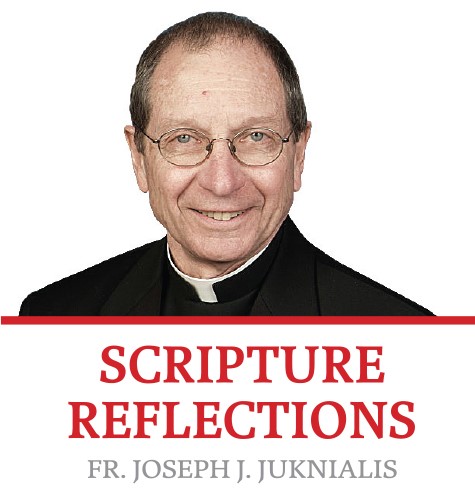Scripture Readings, Nov. 5, 2023
Thirty-First Sunday in Ordinary Time
Malachi 1:14 – 2:2, 8-10
1 Thessalonians 2:7-9, 13
Matthew 23:1-12
Sometimes a person has to simply go with the flow. You know what I mean? Sometimes we can become so entangled with the details of life that life begins to lose its elan, its spark, its delight. They say that the Devil is in the details, yet it’s also true that we can become so obsessed with the little things that we lose sight of what it is that we are trying to accomplish. Sometimes the details themselves can be so blown out of proportion that they become the Devil that poisons the mix, so that the very reality we hope to bring about becomes distorted or lost. Sometimes overlooking the details and going with the flow is what we need to do.
Some years back, the television program “60 Minutes” featured a segment about hospital emergency rooms. The attending physicians and nurses related how their desire to maintain a sterile and safe environment could slip into seeing the very individuals who come for emergency care as people who were desanitizing their spotless environments. They laughed at themselves over the contradictions they were tempted to impose. Though in jest, they would refer to these patients of theirs as GOMERS – Get Out of My Emergency Room, lest you sully our clean environment. They realized how the details supporting their efforts could too easily become the purpose.
This week’s Gospel admonishes the scribes and the Pharisees of that day for being preoccupied with the details of religious life, about the length of the tassels on the hems of their garments and about enlarging their phylacteries (the small leather boxes that contained scripture passages and were worn on their foreheads or upper left arms as signs of presumed holiness). Jesus chides them as well for seeking out special treatment and looking to be seated on the chair of Moses.
Sometimes, the details can seem to become an object of faith itself. Receiving Communion, for example, has always been a personal expression of one’s faith as well as a communal expression. In many ways, however, today the how of sharing in the Eucharist seems to have become an aspect of that faith as well. Some receive Communion in the hand (and recognize the Eucharist as a sacred meal in which we partake), and some prefer to receive on the tongue (to recognize that we are being fed by the Lord Jesus). Some receive on the palm of their hand (an expression of openness to the Lord they receive), and others receive with their fingers (take and eat). Some receive standing (to be fed for the journey on which we continually embark), and others prefer to kneel (our posture of humility and awe before our God). The beauty of the fact that someone chooses to share in the Eucharist is a wonderful and marvelous grace, regardless of how they decide to do so. What seems unfortunate is that the manner of receiving (a detail) sometimes seems to overshadow the what and who it is we are receiving, almost as if the detail has become an object of one’s faith.
Too often, we find ourselves “taking a stand” on the details of faith vocabulary, on whether we gather for the Eucharist or for Holy Mass, whether it is something solemn and holy or a joyful celebration by the community of faith, whether it is a remembrance of the Last Supper or a making present of Jesus’ sacrifice on the cross, whether it is an altar or a table. The Eucharist is all of these, each description a kind of theology or way of putting words to what we are about when we gather as people of faith. Yet, the various theologies are never our faith. Rather, they are efforts to describe our faith, no one theology necessarily better than another – as long as we remember they are attempts to describe the beauty of what it is we truly believe. Sometimes that beauty becomes obscured by our many words.
When Pope Francis addressed the bishops during his visit to Brazil, he confessed that “perhaps we have reduced our way of speaking about mystery to rational explanations, but for ordinary people, the mystery enters through the heart. Only the beauty of God can attract. God’s way is through enticement, allure,” he said. He went on to say that “at times we lose people because they don’t understand what we are saying, because we have forgotten the language of simplicity and import an intellectualism foreign to our people.”
REFLECTION QUESTIONS
How can one keep the details of religious practices in perspective?
What religious practices are important for you?

